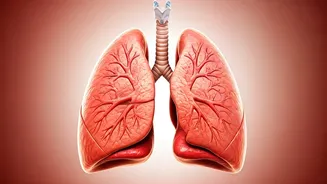Understanding Lung Health
Lung health is crucial for overall wellness, enabling efficient oxygen intake and carbon dioxide removal. Various factors, including diet, can significantly
impact lung function. The foods we consume play a vital role in either supporting or hindering respiratory health. Some foods contain compounds that can irritate the airways, leading to inflammation and increased mucus production, making breathing more difficult. Others may trigger allergic reactions or exacerbate existing respiratory conditions like asthma. Conversely, a diet rich in certain nutrients can help protect the lungs from damage and promote optimal function. This article focuses on identifying and avoiding foods that can negatively affect lung health. By understanding the impact of these foods, individuals can make informed choices to improve their respiratory well-being. This knowledge empowers readers to prioritize foods that support rather than harm their lungs.
Processed Foods' Impact
Processed foods are often packed with additives, preservatives, and unhealthy fats that can harm lung health. Many processed items, like fast food, packaged snacks, and ready-to-eat meals, are high in sodium, which can contribute to inflammation in the body, including the lungs. Artificial trans fats, found in some processed foods, are known to increase inflammation and negatively affect lung function. Excessive consumption of processed foods can also lead to weight gain, which puts additional strain on the respiratory system, making it harder to breathe. Furthermore, these foods often lack essential nutrients, such as antioxidants, which are crucial for protecting the lungs from damage caused by free radicals. Reduced intake of processed foods and a shift towards whole, unprocessed options can dramatically improve lung function. Preparing meals from scratch, choosing fresh ingredients, and reading food labels carefully are effective strategies to reduce exposure to harmful additives and promote healthier lungs.
Dairy and Breathing
Dairy products can trigger or worsen respiratory symptoms in some people, although it's not a universal effect. The proteins found in dairy, such as casein and whey, can lead to increased mucus production in certain individuals. This excess mucus can clog airways, making it harder to breathe and potentially exacerbating conditions like asthma or chronic bronchitis. Some individuals may also experience allergic reactions to dairy, leading to inflammation and respiratory distress. Lactose intolerance, a common condition, can also cause digestive issues that indirectly affect breathing. While not everyone is sensitive to dairy, those who notice worsening respiratory symptoms after consuming dairy products might consider reducing or eliminating it from their diet. This can help evaluate whether dairy is contributing to their breathing difficulties. Alternatives like plant-based milk (almond, soy, oat) can provide similar nutrients without the potential for respiratory issues.
Sugary Drinks' Effects
Sugary drinks are linked to several health problems, including negative impacts on lung health. Sodas, sweetened juices, and energy drinks are often loaded with refined sugars, which can promote inflammation throughout the body. Chronic inflammation can damage the lungs and make breathing more difficult. High sugar intake also contributes to weight gain, increasing the risk of obesity, which can put additional stress on the respiratory system. People who consume sugary drinks regularly may experience a higher incidence of asthma and other respiratory problems. The high fructose content in some sugary drinks may also negatively affect lung function. Choosing water, unsweetened teas, or sparkling water can help prevent the negative effects of sugary drinks on lung health. Reducing the intake of these beverages can contribute to improved respiratory function and overall well-being.
Salty Foods' Role
Excessive salt intake can lead to water retention and increased blood pressure, which can indirectly affect lung health. High blood pressure puts extra strain on the heart, which can negatively affect the efficiency of blood circulation. This can, in turn, reduce the oxygen supply to the lungs and hinder their function. Foods that are high in sodium, such as processed meats, canned soups, and salty snacks, should be consumed in moderation. Individuals with respiratory issues, particularly those with conditions like COPD or asthma, should monitor their salt intake. Using herbs and spices to flavor foods instead of salt, and preparing meals from fresh ingredients, are good strategies for reducing sodium intake. Being mindful of hidden sources of salt in processed foods and choosing low-sodium options can help maintain healthy lungs and efficient breathing.
Fried Foods and Lungs
Fried foods are often prepared with oils that become unhealthy when heated to high temperatures, creating harmful compounds. When these oils are repeatedly used for frying, they can produce trans fats and other toxins that can contribute to inflammation throughout the body, including the lungs. The process of deep frying can also release volatile organic compounds (VOCs) that can irritate the airways and make breathing difficult. The high-fat content in fried foods can also contribute to weight gain, placing additional stress on the respiratory system. People who frequently consume fried foods might experience increased respiratory symptoms. Choosing healthier cooking methods, such as baking, grilling, or steaming, can improve lung health. Reducing the intake of fried foods and choosing nutrient-rich options can result in better respiratory function.
Alcohol's Influence
Excessive alcohol consumption can negatively affect lung health in several ways. Alcohol can weaken the immune system, making individuals more susceptible to respiratory infections, such as pneumonia and bronchitis. Chronic alcohol use can also lead to inflammation in the lungs and airways, increasing the risk of developing conditions like COPD. Alcohol can also impair the cough reflex, making it difficult to clear the airways of mucus and irritants. Moreover, alcohol can interact with certain medications, exacerbating respiratory problems. People with asthma or other respiratory conditions should be cautious about their alcohol intake and consult their doctor. Moderation is key. Avoiding or limiting alcohol consumption helps protect the lungs from damage and supports better respiratory function. Choosing non-alcoholic options and staying hydrated can also benefit overall health and respiratory well-being.













